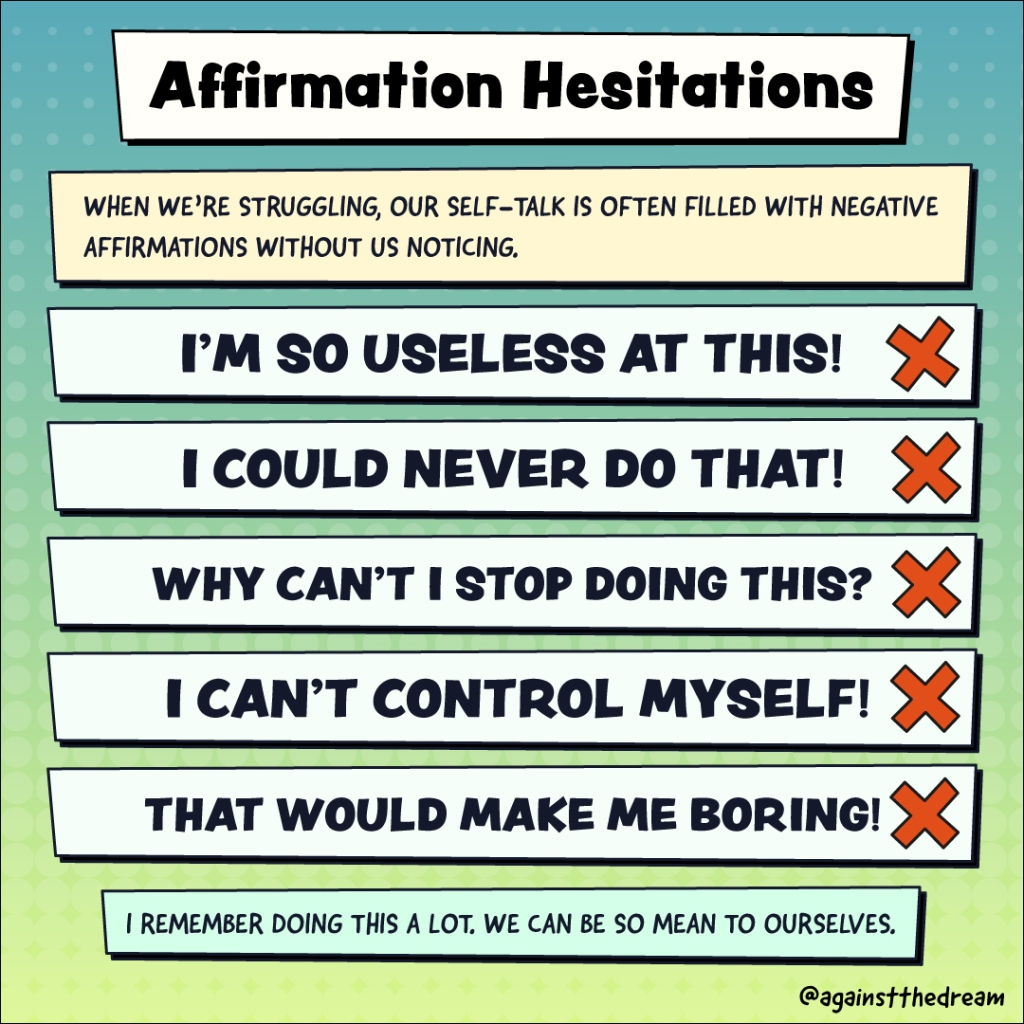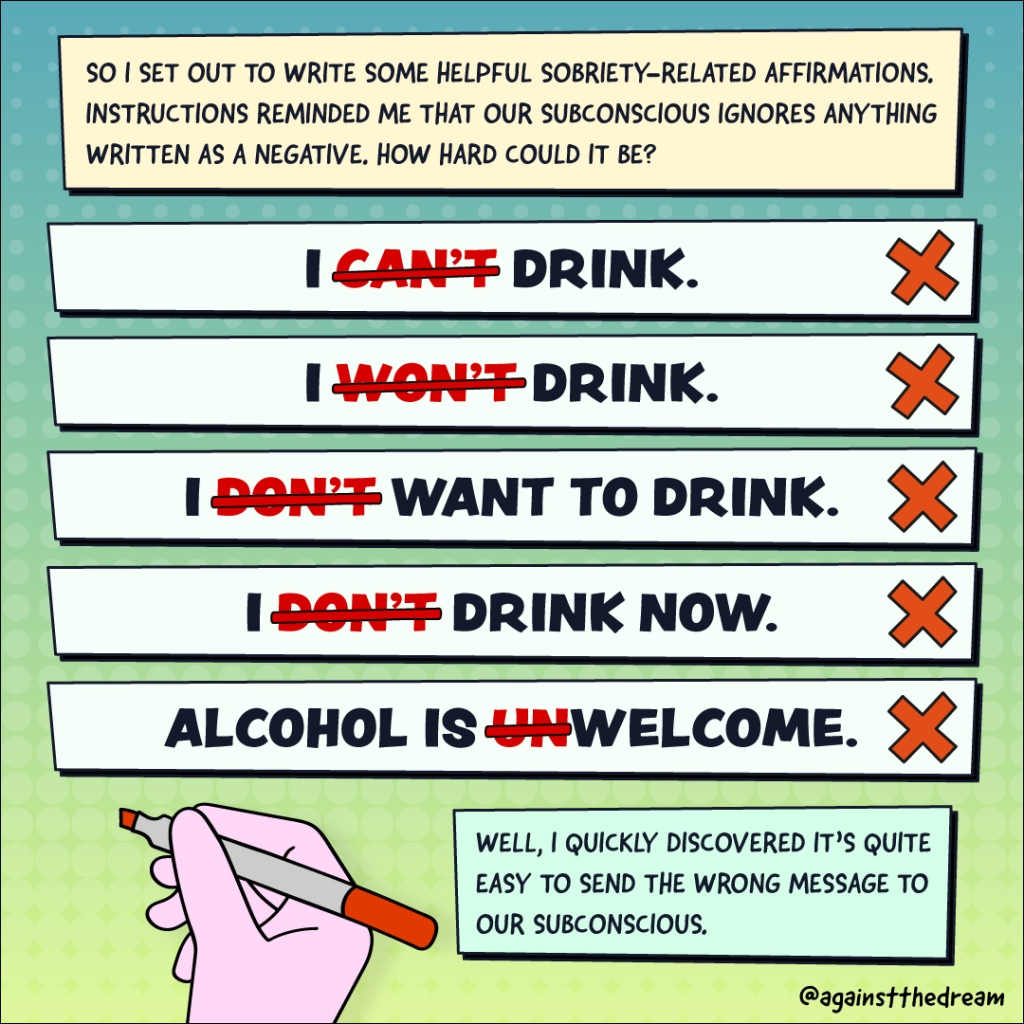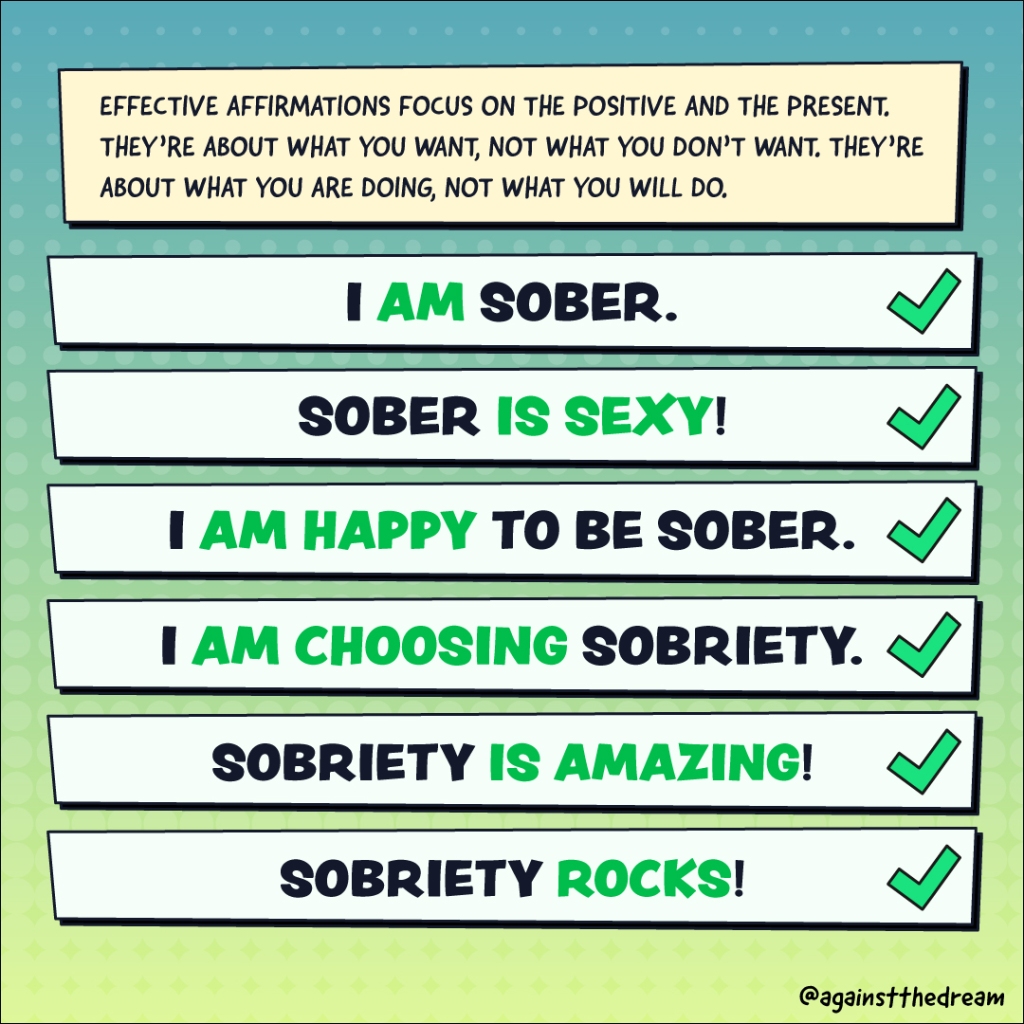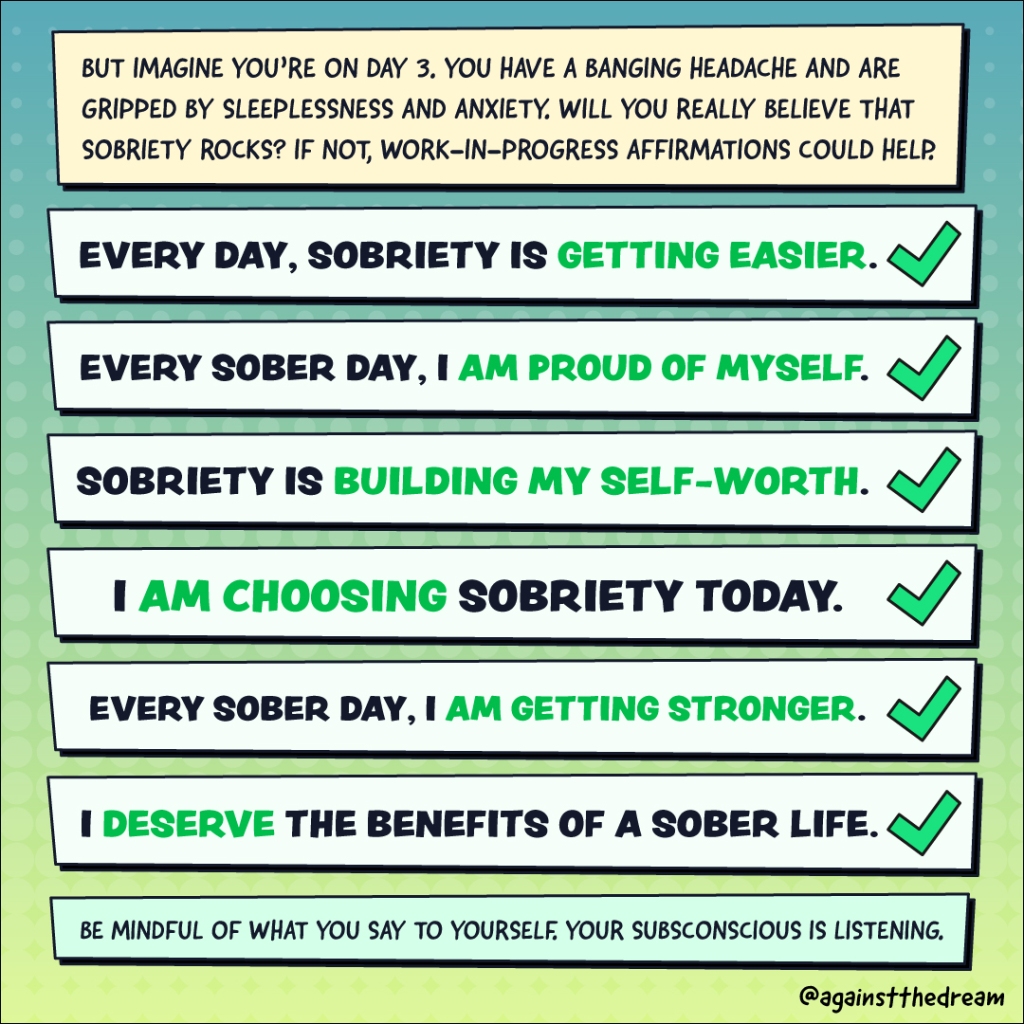A fresh perspective on an old sobriety nemesis.

Like the vast majority of my recovery peers, cravings were a dreaded nemesis when I first stopped drinking. I feared them, and I felt like they had the power to control me. It’s a confusing and disempowering experience to be frightened of your internal dialogue.
I’m grateful that time has transformed my experience of alcohol cravings. At almost two years sober, I rarely have them anymore. I can’t remember the last time I had one that went beyond a fleeting thought. But last week, stressful circumstances disturbed my nervous system enough that I suddenly had an extreme urge to numb out.
The intensity of the craving blindsided me. I initially felt defeated and fell into questioning myself. Hadn’t I moved past this stage yet? Is it a bad sign that I still experience addictive thoughts? My thoughts were all fear-based. Then, I took a deep breath and carefully observed what was happening. Despite the discomfort of the moment, what I discovered was reassuring.
In this article, I examine cravings. What they are, what causes them, and what I have learned about beating them during the last two years of sobriety. I also suggest some tips for dealing with those emergency moments when addictive thoughts strike.
What is a craving?
Put simply, a craving is a strong desire to have something — an extremely strong desire. In early sobriety, these feelings can be overwhelming and, in my experience, can border on panic.
Cravings are a combination of mental and physical discomfort. I experienced racing and intrusive thoughts, feelings of depression, anxiety and overwhelm, and intense urges not to be feeling any of it.
I often felt physically restless and found myself pacing the house or fidgeting. Imagine having a strong urge to run yourself to exhaustion but without the motivation to get started. I felt like a cornered animal at times.
When we discuss cravings in the recovery community, some common themes emerge. Due to the cognitive dissonance between our conscious desire to quit and our subconscious desire to drink, they are frequently experienced and described as disembodied but internal enemies.
Wine witch. Booze bitch. Drink demon. Beer monster. The descriptions are usually hostile and combative, which made sense at the beginning of my sober journey. Stopping drinking takes courage and grit, and having an evil enemy to rebel against can be a source of motivation.
Gradually, I began to experience my inner demons as needy younger versions of myself. I could see and feel the memories of my struggling teenage and young adult selves, the ones who stumbled into using alcohol problematically in the first place. Dealing with them became less about combat and more about compassion.
However we experience cravings, they are always challenging. Learning how to cope with them is one of the most essential skills to develop on a quest for sobriety. More about that later.
What causes cravings?
Cravings have both physical and psychological causes. If we have become physically dependent on alcohol, our cravings can become dangerous in the form of withdrawal symptoms. In the most extreme cases, this is a medical emergency which requires professional help.
Even in less severe cases, when it’s safe to detox away from a medical environment, we can struggle with negative symptoms caused by suddenly removing a habit-forming substance from a biological system that has become accustomed to it.
Drinking alcohol alters the neurotransmitters, or chemical messengers, in our brains. It stimulates massive increases in dopamine production in the reward system beyond anything we could produce naturally. This dopamine boost is what provides the hit we chase.
When we drink habitually, we become reliant on the artificial dopamine boost to feel good. When we stop drinking, our brain initially experiences a significant reduction in dopamine supply. Now, nothing feels good, not even things we would usually enjoy. This dopamine slump is why the first days, weeks and months of sobriety can be challenging and filled with cravings.
Our reward system slowly rebalances, and we regain the ability to feel pleasure and contentment from simple and healthy sources. But this takes time; until it happens, sober life can seem flat and grey. It’s during this period that psychological cravings for the absent dopamine boost can be a menace.
We want to feel good again, and we associate alcohol with making that happen. In early sobriety, we find ourselves in a limbo state where we’ve removed our easy option to feel ‘good’ but haven’t yet adjusted to the stage where it happens naturally. It sucks, and it takes an act of faith to move through this stage, trusting that something better waits on the other side.
I promise that something better is waiting, but you may need to play whack-a-mole with your cravings until you get there. I wish I could tell you it would be easy, but it’s not, and it would only provide false hope. Understanding and accepting this part of the process is necessary.
Finding new ways to naturally boost our dopamine levels can be helpful. An increased interest in exercise and fitness is a popular sober hobby as people explore its positive effect on mood and mental health. Developing a sweet tooth, which is not so healthy, is also common. I became a sugar monster chasing an alternative reward hit during my first eighteen months, and like others, I gained weight.
There are many healthier ways to raise dopamine levels, which I will detail in my list of tips.
What I learned during last week’s sudden craving.
After being mostly free from cravings for a long time, last week’s events were surprising and uncomfortable. I don’t handle stress very well and prefer a simple, peaceful life. Sometimes, though, that’s not possible.
We had a roof repair, which ticked most of my stress trigger boxes. The builder was unreliable, not turning up when agreed. He was pressuring us to have more work done on top of an already expensive job. I hate having strangers in the house and the invasion of privacy, which terrifies our cat. To top it off, my partner got stressed with me for being so stressed.
By the time the builder left, I was prickly and frazzled. Old habitual responses resurfaced, and my inner dialogue screeched that I needed something to stop me from feeling like this. It was a familiar, destructive thought that brought so many memories.
I’ve experienced this haunting need to escape myself for as long as I can remember. As a bullied child, a struggling misfit teen, a confused young and then older adult. It’s like a thread woven throughout my timeline. Although it’s been less noticeable for the last year, I was reminded that the numbing urges still lurk and can strike quickly.
I took a few slow breaths and switched focus to my physical sensations and away from my racing thoughts. My stomach and chest muscles were tight, and I felt a dragging heaviness throughout my body. I remembered that although I felt extremely uncomfortable, this feeling would pass.
I knew without a doubt that I wouldn’t drink and that alcohol would do nothing but make the situation worse. I knew how pointless and fleeting any feelings of relief would be. Alcohol is rubbish, and I knew I didn’t want it.
I ate a pepperoni pizza and some giant cookies. I curled up on the sofa with my now-traumatised cat and lost myself in some Netflix and chill. Slowly, my nervous system decompressed, and the internal drama drifted away. After an afternoon snooze, I felt much better about the day’s events.
Most importantly, I felt immense gratitude that I wasn’t waking up to a banging hangover and feelings of defeat and shame. I was thankful I had the knowledge to deal with the craving and the wisdom not to act unskillfully over temporary discomfort.
I learned that having a craving isn’t a failure or a sign of weakness. Although I would have preferred not to have had that stressful day, I found reassurance and confidence in my ability to handle habitual, unhelpful thought reflexes without wanting to drink. Knowledge, wisdom, and an absence of powerlessness are the opposite of failure or weakness.
The most comforting thing I learned was that alcohol cravings no longer have the power to make me drink. They never did; I only believed they did. Now, I don’t. I don’t like and don’t want them, but I don’t fear them. That feels like freedom.
Here are some tips for dealing with cravings.
When cravings do strike, there are many things you can do to ease yourself through the experience without drinking. Here are a few suggestions:
Remember, they only last for a few minutes.
When we accept and simply experience what is happening during a craving, it helps us to move through it. Addictive thoughts are a normal part of the process of stopping drinking, and like any other thoughts, they arise, pass through our minds and fade away.
Try to observe and feel your discomfort when a craving appears while reassuring yourself it will pass. Instead of listening to your inner addictive voice, pay attention to the physical sensations in your body. Because this moves your focus away from those unhelpful thoughts, it eases the resistance and drama that can prolong them.
Distract yourself until they pass.
Go for a walk. Listen to a sober podcast or audiobook. Tackle a small task on your to-do list. Eat something, preferably healthy, but junk food is still better than booze. Write your thoughts in a notebook. These are all options that have helped me, and once you experiment for a while, you’ll discover what works best for you.
Reach out for help.
You’ll be amazed at the level of support available from recovery peers. Go to a recovery meeting, phone a friend, or go online. My primary source of sober support has been through the sober Instagram community.
If you find asking for help difficult or aren’t ready to put yourself out there, read the updates of your fellow sober folks. Recognising yourself in others’ stories and remembering you’re not alone in facing this can be incredibly helpful.
Talk to your version of the inner addictive voice.
If you visualise a negative, monstrous one, drag it down, insult it and remove its power. Tell it it’s full of bullshit and lies. If you see a struggling inner version of yourself, talk gently and reassuringly to it. Tell it you’re an adult now and can look after it. One of my old comic strips was about this.
I found the latter approach particularly powerful, but reaching that gentler self-compassionate stage took a long time and multiple quit attempts. In hindsight, I wish I’d tried it much earlier.
Learn how to reset an unbalanced nervous system.
You can take back your power to soothe yourself substance-free with simple self-help techniques. Meditation, mindfulness, breathwork, EFT (tapping), and EMDR can all be helpful free or low-cost options. YouTube is a rich resource for learning about such things.
Find healthier ways to stimulate dopamine production.
Exercise. Listen to music. Dance. Snooze. Get outside in the daylight and catch some sun if possible. Have sex. Have a tasty, protein-rich snack. Meditate. Create something. Get hot (sauna). Get cold (showers or wild swimming).
Do anything that brings you enjoyment in healthier, less destructive ways than drinking. They won’t bring the dramatic burst of dopamine you get from alcohol, but a combination of them can have a helpful cumulative effect on your mood during early sobriety.
I hope you find something helpful here. Dealing with cravings can seem like an impossible task when you first remove alcohol from your life. I understand how you feel; I’ve been there repeatedly. Addictive thoughts do fade over time, though. They become less frequent, quicker to pass and more manageable. It might seem hard to believe, but it’s true. Keep going, and it’ll happen for you, too.
































